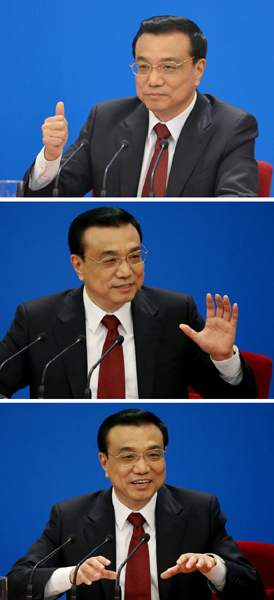The man of the people is a topic among the people
New premier makes his mark with confident media appearance, report Zhu Zhe, Cui Jia and Ding Qingfen.
It's been four days since Li Keqiang gave his first media briefing as the new premier, but people are still exchanging opinions and discussing their impressions.
 |
|
Premier Li Keqiang at the news conference on Sunday. [Photo/Xinhua] |
|
With his speech, Li broke the mold By Raymond Zhou |
The briefing attracted a huge amount of attention, not only because it was seen as marking the beginning of a new and more complex phase in China's reform, but also because it signaled the completion of the process of the national leadership transition that began in November, when Xi Jinping was elected as the new head of the Communist Party.
Li, who holds degrees in law and economics and is fluent in English, was approved as premier for the next five years at this year's meeting of the National People's Congress, which closed during the weekend.
Comments from all sectors of society welcoming Li's debut media performance as premier and expressing optimism amid rising expectations of the new leadership's capabilities have piled up in the press and a variety of Internet forums.
"Li has sent out a clear message in a concise and practical way on how he will steer the new government, and he expressed his resolve to push forward reforms and strengthen the rule of law," said Li Chengyan, a professor at Peking University's school of government. "These are core issues in today's China, and we're expecting more details and action."
It has become a tradition that the premier meets the media at the close of the annual NPC session, which is usually held in mid-March. It is the only opportunity the media will get to directly question the country's top administrative leader.
'Self-imposed revolution'
At about 10:30 am on Sunday, 57-year-old Li walked into the press hall on the third floor of the Great Hall of the People - dubbed "the Golden Hall" because of its glittering decor - accompanied by four vice-premiers, all under the gaze of about 800 Chinese and foreign journalists.
During the two-hour briefing, Li employed his characteristic ease and good humor as he provided answers to a wide array of questions on topics such as reform, urbanization, corruption, pollution and food safety, without referring to notes.
Li outlined the top three tasks of the new government - to maintain economic growth, improve people's livelihoods and safeguard social justice - and pledged to push forward reforms and strengthen the rule of law.
He promised to boost reform in all sectors and build a prosperous society. "However deep the water may be, we will wade into it because we have no alternative," he said.
He said the size of the government is unlikely to expand.
|
The Guardian "He added a personal touch by stressing his experience of working on the land as a "sent-down youth". He said he would not forget the hardship faced by farmers, but also focused on the way that reform had transformed people's lives." The New York Times "On economic matters, he has demonstrated a keen understanding of complex theory. More recently, he has been a vocal advocate for economic restructuring and the importance of a level playing field for private business." The Telegraph "Li Keqiang said he would open the economy to market forces and strip power from the State in an effort to help China grow by 7.5 percent a year until 2020." The Times of India "Addressing his first news conference after taking over as premier, Li Keqiang sought to allay concerns about the slow growth of China's economy as well as apprehensions about China's rise as a global power." Reuters "Li's English skills say more about the man who will run the world's second-largest economy than just an ability to chat with US chief executives and European prime ministers - they were learned as part of a surprisingly liberal university education." AFP "He (Li) takes charge as China's breakneck growth has steadily slowed and the need looms to rebalance away from investment and exports and toward domestic consumption. In his position as one of Wen's vice-premiers, observers praised him for helping China navigate the global financial crisis and pushing forward efforts to restructure the economy." |
He warned government employees to forget any ambitions they harbored about becoming rich - pursuing government office and making money at the same time have always been separate paths since ancient times - and used his opening remarks to call on the new leadership to uphold the country's constitution, an uncommon sentiment on such an occasion. "The law has a sacred place in our society. No matter who you are or what you do, the boundaries of the law cannot be breached," he said.
Li's resolve is complemented by his down-to-earth working style. He said he has tried to "strike a balance between the ideal and reality", and has pushed for reform in a gradual, but steadfast manner. "We do what we say and we brook no lip service," he told the assembled reporters.
The premier's background in law and economics equips him with the knowledge a leader needs, according to Cheng Li, head of research at the John L. Thornton China Center of the Brookings Institution in the United States. "Li is the first Chinese premier with a legal background," he noted.
"His long experience is also a huge advantage, having worked as head of Henan, the country's largest agricultural province, and also in the large industrial province of Liaoning."
Theodore Moran, a professor of international business and finance at the School of Foreign Service at Georgetown University in the US, said Li's educational background will lead observers to hope he will be a major force for greater economic liberalization and transparency, and in the fight against corruption in China.
- Li stresses trust is key element
- Li Keqiang - Premier of State Council
- Foreign leaders congratulate Li on election as premier
- Li sets out strategic mission for next 5 years
- Li vows to crack down on corruption
- Li reaffirms road of peaceful development
- Premier Li stresses reform, opening up
- Li pledges to prudently advance urbanization
- Premier Li Keqiang meets the press today
- Premier sets sights on economic growth
























